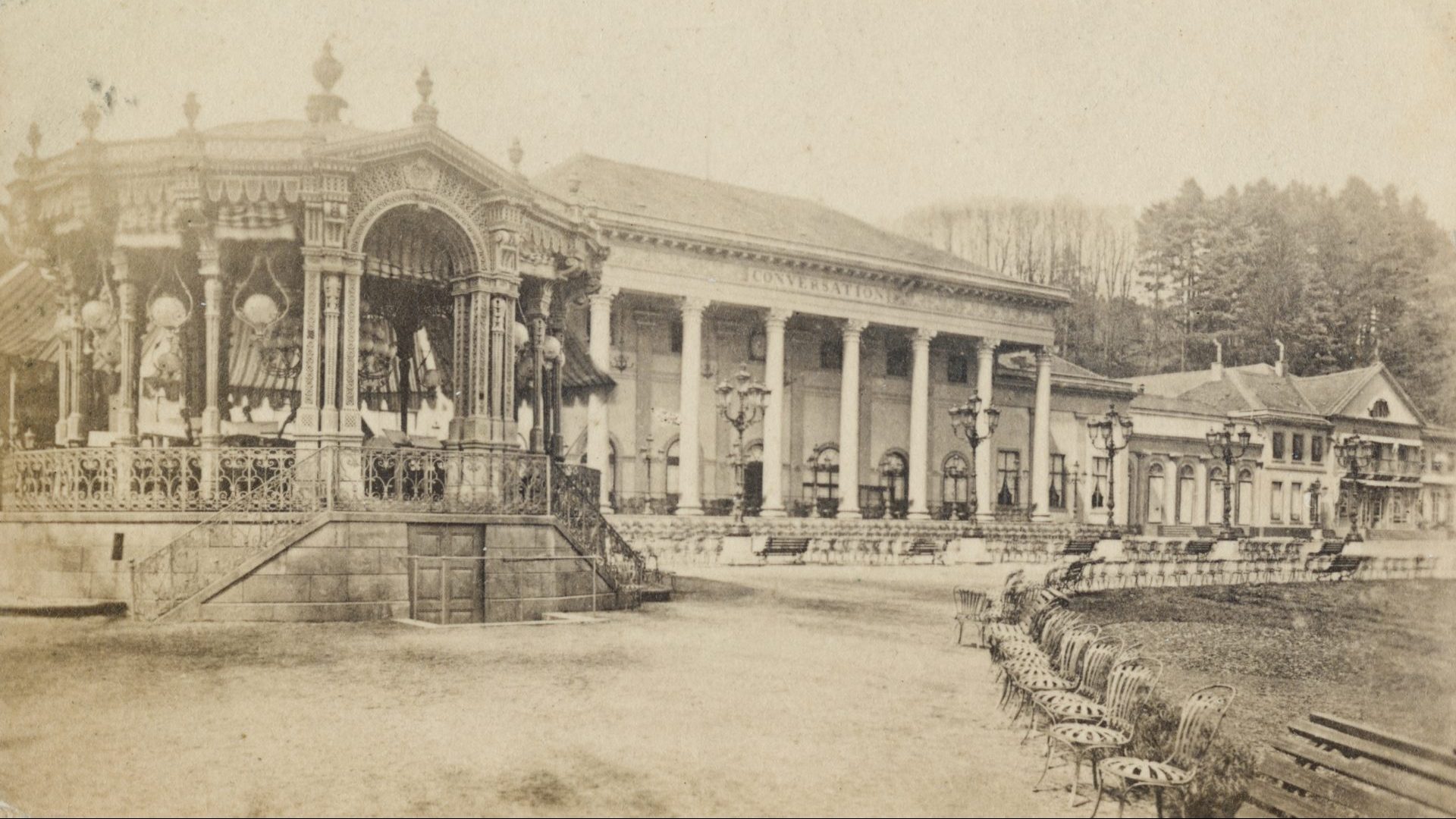One afternoon at the dawn of the 1990s, Susan Sontag was exploring the then-thriving cluster of second-hand bookshops gathered on London’s Charing Cross Road.
Rummaging in a basket of bargains, she came across a slim hardback with a green cover on which the title Summer in Baden-Baden was picked out in white above an illustration of a brown suitcase. “From the life of Dostoevsky” it said just above the author’s name, Leonid Tsypkin, a writer of whom she had never heard.
Intrigued by the mention of Dostoevsky, Sontag bought the book, popped it into her bag and went about the rest of her day.
When she began to read her new purchase that night she was instantly smitten. This, she would write, was a book “which I would include among the most beautiful, exalting and original achievements of a century’s worth of fiction and para-fiction”.
Thanks mainly to her persistent endorsements, Summer in Baden-Baden was republished in 2001 with an introduction by Sontag, another edition appearing four years later. While both were decently reviewed, however, the book soon faded from view.
Next month sees Summer in Baden-Baden revived under the splendid Faber Editions banner, retaining Roger and Angela Keys’ definitive original translation and Sontag’s introduction to present a whole new generation with the opportunity to experience Tsypkin’s mesmerising, dreamlike prose. Perhaps, at last, this remarkable book will finally earn the status it has long deserved. Perhaps, at last, the time is right for Summer in Baden-Baden.
Tsypkin’s masterpiece weaves together two narrative threads. In late-1970s Soviet Russia, when and where the book was written, a Russian Jew who is obsessed with Dostoevsky takes the train from Moscow to Leningrad where he plans to visit locations associated with the great Russian novelist. He carries a copy of the diary kept by Dostoevsky’s second wife Anna Grigoryevna during the couple’s journey during the summer of 1867 to Baden-Baden, undertaken largely to escape creditors at home.
The second strand is an account of the Dostoevskys’ journey across Europe and a convincing portrait of one of the greatest creative minds this continent has ever seen.
Tsypkin’s book is exceptional in how he writes these parallel threads – uncompromisingly. He asks a lot of the reader. There are no chapters, no breaks at all in the text in fact, other than new paragraphs. The narrative threads run into and against each other, switching between the first person and the third, flinging you back and forth between the 1970s and the 1860s.
And the sentences. My goodness. Tsypkin’s sentences run on forever, their clauses separated by commas, dashes or the word “and” and spreading over a page or more.
There is no easing into this idiosyncratic style, either: the first sentence of the book, in which we learn the protagonist is on a train gathering speed as it leaves Moscow and describes in detail the diary he is about to read, how and where he obtained it and how he had it rebound, runs to just shy of 400 words.
Yet after some mild bewilderment during the first few lines, the reader is absorbed right from that first sentence, easing effortlessly into Tsypkin’s intricate rhythms – for which we must wave our hats in the air at the translators for rising emphatically to a considerable challenge. Tsypkin’s is a unique style that manages to be pacy to the point of breathlessness while at the same time lulling the reader into a dreamy reverie and the Keys’ translation evokes this perfectly.
Summer in Baden-Baden should be on the shelf of any fan of Russian literature. Dostoevsky himself is right there on the page, vivid in all his flaws and contradictions that embody the golden age of the Russian novel and the essence of the Russian psyche alike. As for Tsypkin himself, his is a very modern Russian story that could almost have come from a novel.
Leonid Tsypkin was born in Minsk in 1926 to two Russian-Jewish doctors. His father, an orthopaedic surgeon, was arrested in 1934 during the Great Terror and only released following lobbying by an influential friend after attempting to kill himself in prison by throwing himself down a flight of stairs.
Three of Tsypkin’s siblings died during the Great Purge of the 1930s and when the Germans arrived in Minsk at the start of Operation Barbarossa, his mother, a sister and two nephews were murdered in the Jewish ghetto.
Tsypkin was a student doctor at the time and it was only thanks to a grateful patient that he, his wife and their son escaped to the countryside hidden among barrels of pickles on the back of a truck.
When Stalin ramped up his own antisemitic policies in the years following the second world war, Tsypkin, a brilliant medical researcher as well as physician, was forced to lie low and take a job at a remote rural psychiatric facility. Only after the death of Stalin in 1952 could he relocate to Moscow and begin his career in earnest, where among other things he was instrumental in introducing a polio vaccine to the Soviet Union.
Through all his tribulations, however, Tsypkin found solace by immersing himself in Russian literature. A voluminous reader, even towards the end of his lengthy medical studies he toyed with switching to study literature instead.
A keen recreational poet, it was not until his 40s that Tsypkin began to write in earnest. He commenced work on Summer in Baden-Baden in 1977, the same year that this quiet, unassuming man again found himself at the heart of the worst of the 20th century.
That year his son applied for permission to emigrate with his wife to the United States. The application was eventually successful, but Tsypkin, one of the most qualified and experienced research physicians in Moscow, found himself demoted to junior researcher and his salary reduced by 75%.
Facing a lifetime anchored to the foot of the career ladder, in 1979 he applied for exit visas for himself and his wife. For two years he waited for a response before being rejected in 1981. After a second application the following year Tsypkin was informed that not only would he never be allowed to leave the USSR, he was now also fired from his job.
Five days later he was dead, from a heart attack while sitting at his writing desk.
He had, at least, finished Summer in Baden-Baden by the time he died. When it was confirmed in 1981 that Tsypkin’s original application to emigrate had been rejected, aware that he would never be published in the USSR, he gave the completed manuscript to a pair of American journalists returning to the USA and asked them to do what they could.
A week before his death, the first instalment had been published in a Russian-language literary journal in New York. Tsypkin died not knowing he was a published writer.
Summer in Baden-Baden was published in book form in English for the first time in 1987 by the London-based Quartet Books but was barely reviewed and sold only a handful of copies, which is why it ended up in a bargain bin of forgotten books waiting to be found by Susan Sontag.
The 2001 and 2005 editions met with slightly more attention – the Independent called Tsypkin’s masterpiece “astoundingly original”, the London Evening Standard declared it to be “approaching genius” and AN Wilson in the Daily Telegraph declared it “a perfect book” – but again Summer in Baden-Baden somehow failed to set the world alight.
Maybe this time, at last, it will go the distance. It deserves to, partly for the dogged way the book has clung on by its fingertips to the edge of the abyss of obscurity ever since Tsypkin pulled the last sheet from his typewriter, but mostly because it is an extraordinary achievement that absolutely merits a place among the great works of modern Russian literature.
Even taken as just a character study of Dostoevsky, Summer in Baden-Baden is a triumph. We experience his travels through his eyes and those of his devoted and long-suffering wife Anna. Wherever they go Dostoevsky feeds his gambling addiction, losing every time but feeling “an exhilarating sensation of falling which made him feel superior to the surrounding world and even somewhat pitying of his fellow men”.
For Dostoevsky, the line between winning and losing is a thin one, just as it is between pride and humiliation, wealth and penury, love and hate, the rational and screamingly irrational.
The overriding sense of Summer in Baden-Baden is Tsypkin’s own wrestling with the virulent antisemitism of an author whose work he loves to the point of obsession. To him, it is more than an intellectual question of whether one can or even should separate art and the artist. Tsypkin spent his life under regimes where prejudice against Jews was state policy and he had the missing family members to prove it.
Yet his hero, one of the greatest writers in history, a man who wrote with a bottomless well of compassion and rare insight into the human condition, would have despised him.
Tsypkin writes of how “it struck me as being strange to the point of implausibility that a man so sensitive in his novels to the suffering of others, this jealous defender of the insulted and the injured who fervently and frenetically preached the right to exist of every earthly creature… that this man should not have come up with even a single word in the defence or justification of a people persecuted over several thousands of years – could he have been so blind? – or was he perhaps blinded by hatred?”
Tsypkin’s obsession with Dostoevsky is a love not only unrequited but effectively counter to reason. Summer in Baden-Baden is a howl of disbelief and incomprehension that the highest-profile literary representative of the nation and culture that made Leonid Tsypkin, that made him the person and writer that he was, would have hated him not for who he was, but for what he was.
This wrangling thrums through a beautiful book that, almost half a century after it was written and after several false starts, could find its place in the world at last.
Summer in Baden-Baden by Leonid Tsypkin, translated by Roger and Angela Keys, is published on June 6 by Faber & Faber, priced £9.99




